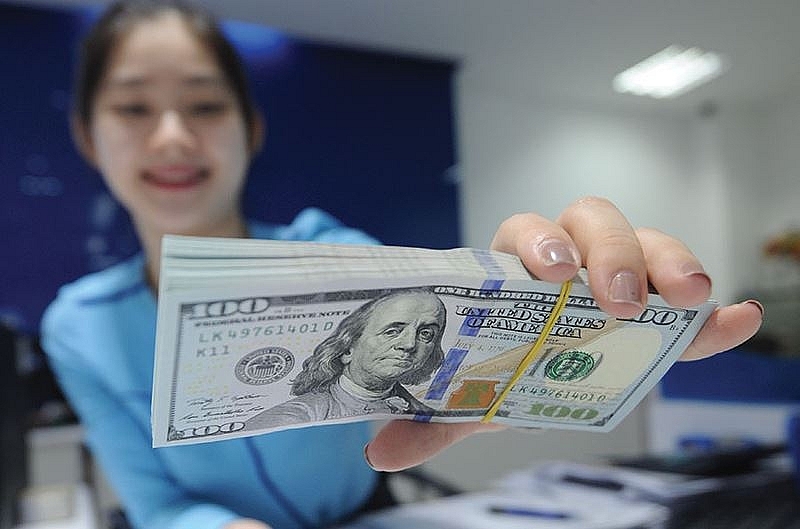Businesses tackle exchange rate volatility with flexible solutions
 |
| The dong-dollar exchange rate rose by 1.4 per cent on the interbank market in the year to date |
The VND-USD exchange rate rose by 1.4 per cent on the interbank market and 2.3 per cent on the free market in the year to date, after having remained fairly stable in the past year.
Nguyen Hong Khanh, analysis director at Vietnam International Securities JSC (VIS), quoted statistics saying that the Vietnamese dong had lost more than 30 per cent in value against the US dollar in the past decade.
The devaluation was most serious during 2008-2011, when the local economy fell into a slump amidst the global economic crisis, and then again in 2015, when the Chinese Yuan was devalued.
Exchange rate volatility has often had serious impacts on the performance of businesses, especially for firms that took up dollar-denominated loans or have to import materials to serve their production and business activities.
| As the current global financial market is hard to predict, it is extremely hard for firms to properly forecast exchange rate developments, which keeps them from selecting a suitable currency for making payments. |
State-owned oil and gas group PetroVietnam recently estimated that an exchange rate rise of about 2 per cent would result in losses that could surpass VND1.8 trillion ($796.4 million). So far this year, the exchange rate has already inched up 1.4 per cent.
As the current global financial market is hard to predict, it is extremely hard for firms to properly forecast exchange rate developments, which keeps them from selecting a suitable currency for making payments.
Firms have resorted to various measures to cope with this exchange rate volatility.
Pham Viet Anh, general director of PetroVietnam Transport JSC (PVT), said the company has been prepared to deal with unfavourable exchange rates.
“Since 2016, PVT has converted its USD-denominated loan contracts into VND-denominated contracts where the interest rate remained low, helping the company reduce burdens from exchange rate differences. Our debt volume sank from $200 million in 2011 to $80 million in 2016 and now only amount to a few million dollars,” said Anh, adding that holding on to a number of transport contracts with foreign partners based on USD payments might even be an advantage, as this would lead to some profit when these dollar funds are later converted into Vietnamese dong.
According to Tran Quoc Dung, chairman and general director of Kien Hung Seafood JSC (KHS), his company currently has about $2 million in USD-denominated loans, so exchange rate volatility certainly affects their operations.
However, KHS have made provisions for a scenario of a 2 per cent exchange rate increase, which is why their losses are still under control.
“In addition, banks allowing firms to flexibly convert the currency of their USD-denominated loans into other currencies to match market conditions have helped firms take initiative in controlling exchange rate risks. Over the past months, a slew of firms have shifted from USD- to VND-denominated loans,” Dung said.
A top manager of a Hanoi-based company with a large amount of USD-denominated debts said that his company has resorted to derivative products, such as futures contracts to minimise exchange rate-related risks, while several other firms chose to prepare large amounts of dollars for debt payment.
“The early third quarter is often the time when import firms conceive import plans as well as make periodical payments. The exchange rate, therefore, is often the most volatile at that time. This requires firms to carefully consider any and all steps to mitigate risks,” the manager said.
What the stars mean:
★ Poor ★ ★ Promising ★★★ Good ★★★★ Very good ★★★★★ Exceptional
Related Contents
Latest News
More News
- Vietnamese businesses diversify amid global trade shifts (February 03, 2026 | 17:18)
- Consumer finance sector posts sharp profit growth (February 03, 2026 | 13:05)
- Vietnam and US to launch sixth trade negotiation round (January 30, 2026 | 15:19)
- NAB Innovation Centre underscores Vietnam’s appeal for tech investment (January 30, 2026 | 11:16)
- Vietnam moves towards market-based fuel management with E10 rollout (January 30, 2026 | 11:10)
- Vietnam startup funding enters a period of capital reset (January 30, 2026 | 11:06)
- Vietnam strengthens public debt management with World Bank and IMF (January 30, 2026 | 11:00)
- PM inspects APEC 2027 project progress in An Giang province (January 29, 2026 | 09:00)
- Vietnam among the world’s top 15 trading nations (January 28, 2026 | 17:12)
- Vietnam accelerates preparations for arbitration centre linked to new financial hub (January 28, 2026 | 17:09)

 Tag:
Tag:


























 Mobile Version
Mobile Version